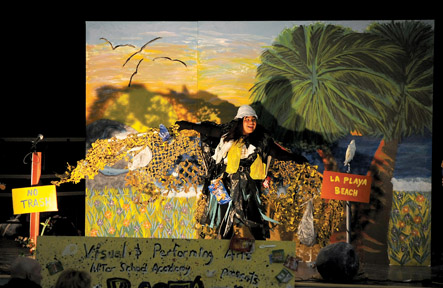
Agency partners with school foundation for after-school
program
More than two dozen Aromas School students performed a one-act
play for their peers and community members April 15. The
performance is the culmination of a four-week after-school program
called the Hollister Youth Alliance Visual and Performing Arts
Program.
The play
”
Basta Basura,
”
or
”
Stop the Trash,
”
included students dressed for a day at the beach or as marine
animals. Other students played musical instruments during the short
performance. Still others designed the set.
Agency partners with school foundation for after-school program
More than two dozen Aromas School students performed a one-act play for their peers and community members April 15. The performance is the culmination of a four-week after-school program called the Hollister Youth Alliance Visual and Performing Arts Program.
The play “Basta Basura,” or “Stop the Trash,” included students dressed for a day at the beach or as marine animals. Other students played musical instruments during the short performance. Still others designed the set.
Evelyn Rios, a fifth-grade student, played one of the roles as Rosa Maria, a girl who goes to the beach. Rosa Maria ends up with an empty water bottle, but there are no trash cans around. A trash monster tempts her to just throw it in the ocean, but other sea creatures remind her of some simple ways she can make a difference by reducing waste, reusing bottles and recycling.
“I like to play around,” Rios said, after the students finished their first performance of the day. “My favorite part is doing the play with everybody else and being in costumes.”
Of the students playing musical instruments, some admitted to being a little nervous performing in front of their peers.
“I really wanted to play bass, but I also wanted to play drums,” said Kael Simons, a seventh-grader. “It was fun being able to play whatever you want.”
The play was developed by Kinan Valdez, of El Teatro Campesino, a theater group is based in San Juan. They worked with the Monterey Bay Aquarium to create new one-act plays such as “Basta Bastura” and “Watt a Waste” to raise awareness of global warming and conservation. The play has been performed at the aquarium and the positive message of taking care of the ocean offered an educational piece for the students.
“I like that Maria was trying to, at the end, save the world,” said Imani Hernandez, a fifth-grader, who played the turtle in the play.
The program piloted at San Juan and Aromas Schools, came out of a request from a San Juan Aromas Community Schools Foundation board member to provide an after-school program in the district. Funding for the program came from the Foundation and the San Juan Aromas Unified School District.
“The Foundation was on a mission to take action,” said Victoria Valadez, the Hollister Youth Alliance program manager. “They had a really good pulse on what these students needed. I was really impressed with them knowing their schools.”
Though they were open to running programs for kids in K-8, as they do at Hollister schools, they ended up working with fifth through eighth-grade students.
“We wanted to focus on middle school because we felt our middle school students needed something to do,” Valadez said. “We did decide that that age group was going to be our focus.”
After they selected the age group, HYA decided to look at El Teatro as a partner.
“These kids are working with real artists in visual arts, theater and music,” she said. “They are exposed to that. It’s been a seamless transition into the partnership.”
Once all parties agreed, they moved quickly because they wanted to offer the four-week program to both schools before the end of the school year.
Valadez estimated that 23 students were involved from Aromas, with two Anzar students volunteering time to help. At San Juan, 16 students participated.
“It’s amazing what they can do in a short amount of time,” she said.
Emiliano Valdez, who works with HYA, Artists in the Schools and El Teatro Campesino, explained to the audience a little bit about the history of El Teatro.
“The form you are seeing here today started as actos,” he said, explaining that the theater started in the 1960s as a way to talk about farm workers’ rights. “That’s Spanish for one-act plays. Now that those issues are solved, they are using new ways to bring it up to date.”
Valdez acknowledged the hard work of the students involved. They met four days a week for one and half hours a day during the four-week program.
“They showed an amazing amount of dedication and quite a bit of talent,” he said.
For the kids, it was all fun to learn knew skills. Jessica Driver, a seventh-grader, said she signed on because she wanted to learn the drums. Other kids agreed that it was a great chance to learn.
“I wanted to learn to move and be a part of the music, performing,” said Michael Howard, an eighth-grader.








